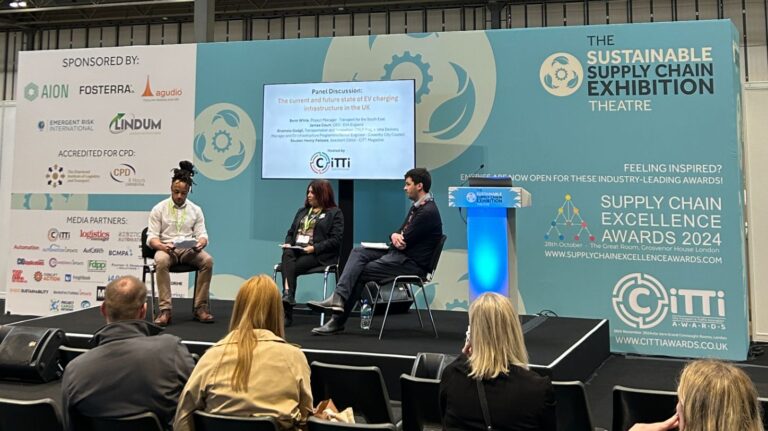CiTTi Magazine‘s panel discussion concerning the current and future state of the electric vehicle (EV) charging infrastructure in the UK took place yesterday [19 March] at Sustainable Supply Chain Exhibition 2024 – co-located with IntraLogisteX and Robotics and Automation.
The panel, which was moderated by CiTTi assistant editor Reuben Henry-Fellows and took place at the Sustainable Supply Chain Exhibition Conference Theatre, discussed a host of issues related to EV charging including the equitability, environmental and future expansion of infrastructure across the UK.
The panellists included Shamala Gadgil, Coventry Very Light Rail programme delivery manager and EV infrastructure senior engineer, and Benn White, project manager at Transport for the South East.
Together, they discussed the challenges and benefits of EV charging schemes implemented within their respective constituencies; the pair detailed how EV charging networks can expedite private- and public-sector partnerships, positively impact greenhouse gas emissions and improve air quality.
Referencing her constituency, Coventry, an area of the UK with the most EV chargers outside London, Gadgil highlighted the urban impacts of reduced coverage in areas with increasing EV fleets and private ownership.
In reference to this, when questions were opened up to the audience at the session’s end, a member of the audience questioned current EV charging installation strategies and how it can be applied evenly.
When discussing the equitability of EV charging infrastructure rollout in the South East, White said: “Transport for the South East covers a large area, including many rural areas and constituents.
“These include people that otherwise would be ignored by traditional EV rollout providers which focus, understandably, on high density environments.
“What we’re trying to do is ensure that these areas are serviced by EV charging infrastructure or are targeted in our future rollout strategy.
“If we can tackle these areas, Transport for South East can create a comprehensive network for the benefit of all.”
Following this, another member of the audience asked whether the current timeline for the UK government’s net-zero goals, which have been pushed back from from 2030 to 2050, are feasible with the current rollout of EV charging infrastructure.
In response, Gadgil said: “To reach net zero 2050, the government is creating long-term business plans, five-, eight-, 10-years long. The feeling [amongst transport officials] is that this is an achievable goal.”
To reach this goal, the audience member who posed the question said the energy required demands sufficient energy created by local authorities – a feat not currently undertaken on a localised level.
Gadgil replied: “The infrastructure is there; I think we are doing a lot from the renewable energy side. There’s a lot of positive movement being taken in this direction by the government, instructive plans in relation to renewables that will increase output.
“Coventry already has one such scheme that became available last year through EDF Energy.
“I think, right now, the infrastructure is being developed, the target here is not 2030 but 2050. We are preparing all this to be ready by then. If it’s not ready by then, we are doing something very wrong.”
Another member of the crowd posited that, with bus services on the decline throughout the UK, the push towards the EV transition may compete with or even harm conventional public transport services.
How is the UK government dealing with this conflict of interest? In response, Gadgil said: “I think both can exist and operate concurrently. We, as a council, aren’t trying to limit the progress which is being made by either.
“I can only speak for Coventry, but we’re ensuring that we meet the needs of our constituents – car drivers and public transport users – by providing these services.”
Sustainable Supply Chain Exhibition 2024 is open until 3.30pm today. Missed day one and want to attend today? Click here to register for your FREE visitor pass.





